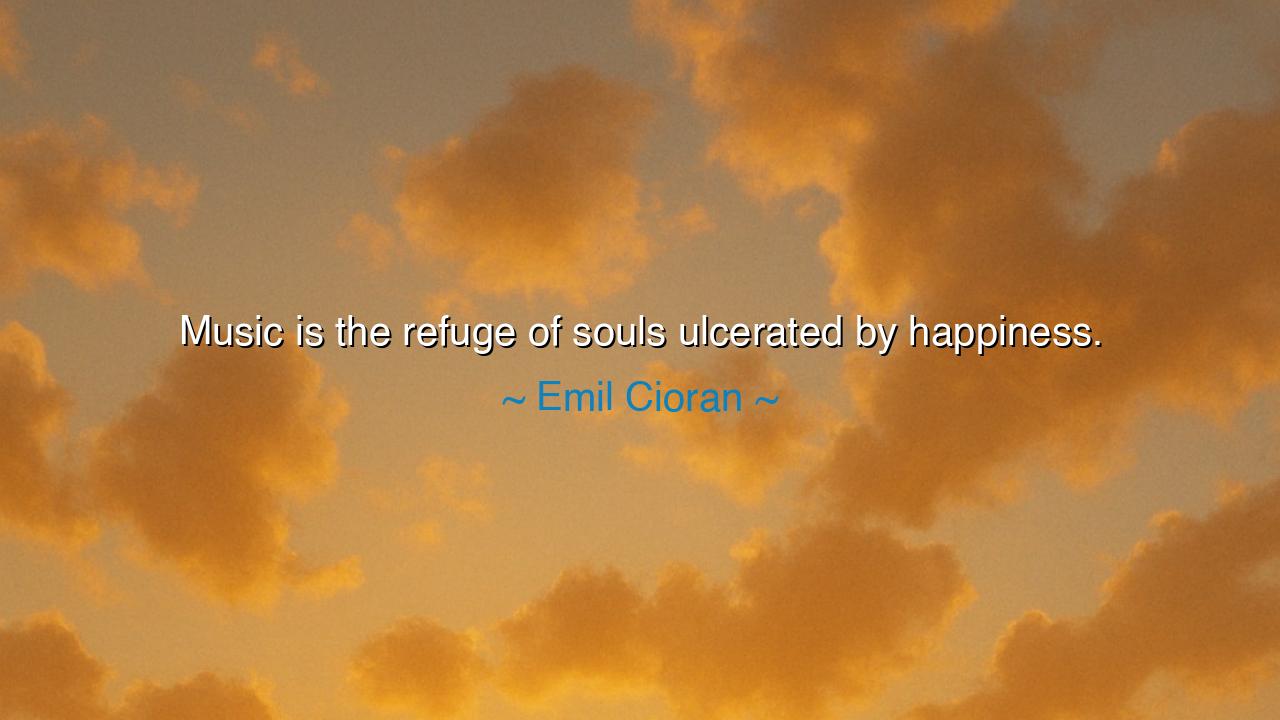
Music is the refuge of souls ulcerated by happiness.






“Music is the refuge of souls ulcerated by happiness.” — So spoke Emil Cioran, the philosopher of despair, whose words gleam like dark jewels carved from the stone of suffering. He was a man who gazed too deeply into the brightness of existence and saw, not comfort, but pain hidden beneath the veil of joy. His thought was born of the midnight mind, that place where laughter and tears mingle until one can no longer tell them apart. To understand this saying, one must not think of music merely as sound — but as the secret temple where wounded hearts seek shelter from the cruel perfection of happiness.
What is this strange idea — that happiness, the very thing men chase, can ulcerate the soul? Cioran speaks of the sorrow that comes after joy, the ache that follows fulfillment. When the heart has tasted beauty too keenly, when one’s desires have been met only to reveal their emptiness, something in the spirit begins to bleed. Too much light blinds; too much peace suffocates. The one who has achieved all he sought often discovers a new torment — the absence of striving, the silence of meaning. Thus the soul, raw and restless, seeks refuge — and it finds it in music, that eternal bridge between ecstasy and anguish.
For music alone understands the contradictions of the human heart. It can rise in triumph and weep in the same breath; it can console without words, and break without cruelty. It is the voice of the soul when language fails. In the trembling of strings, in the cry of the violin or the thunder of the drum, man finds himself again — not whole, but reconciled. Where philosophy dissects and religion promises, music simply is. It holds us gently when thought becomes unbearable. Cioran, whose mind was too lucid for peace, turned to music as one might turn to a friend who speaks only in sighs. There, amid melody and dissonance, he found not salvation, but something greater — understanding.
Remember the story of Ludwig van Beethoven, who, when struck deaf, was driven to the edge of despair. What greater cruelty could there be for a musician than silence? Yet from that silence he drew the storm of the Ninth Symphony — a hymn not of happiness, but of transcendence through pain. He knew that joy could wound, that perfection could crush. And so he poured the unbearable contradictions of the human spirit into music. When the “Ode to Joy” bursts forth, it is not a naive celebration — it is the cry of a soul that has suffered everything, yet still dares to sing. In that defiance lies Cioran’s truth: music is the refuge of those who have been torn open by the beauty of living.
For those whose hearts are too tender, who feel too much — happiness can indeed become poison. When joy burns too brightly, it exposes the frailty of all things, the fleeting nature of love, the inevitability of loss. The soul, overwhelmed, retreats not into silence but into sound — into the soft arms of a melody that neither denies nor explains, but simply holds. This is why music heals where words fail: it does not seek to cure the wound, but to give it meaning. It tells the ulcerated soul, “You are not alone.”
And so, my student of life, learn from this paradox. Do not chase happiness as if it were a crown to wear forever, for even joy can become a chain. When life overwhelms — when love is too intense, or victory too complete — turn to music. Let it carry your sorrow without shame, your joy without pride. Listen not only with your ears, but with your wounds. For within each note is the promise that beauty and pain are not enemies, but twins born of the same heart.
The lesson is this: Seek not escape from your emotions, but communion through them. When happiness cuts too deep, when peace feels unbearable, let music guide you into balance. Sing when you cannot speak. Play when you cannot pray. And remember always that the noblest souls — those ulcerated by happiness, pierced by too much feeling — are not broken; they are simply attuned to the deeper music of existence. In their suffering lies the rhythm of all creation, and in music, they find both their sorrow and their salvation.






AAdministratorAdministrator
Welcome, honored guests. Please leave a comment, we will respond soon